
JOIN US
GET OUR KUNEKUNE
NEWSLETTER
New and highly discounted products, fresh and hot stories & useful information
Learn About Kune Kune Pig Meat
KuneKune Meat for Your Homestead - What you need to know
Are you interested in learning about raising KuneKune pigs for meat? In this article, you'll discover everything you need to know about this hot topic, including how to raise KuneKunes for KuneKune meat, KuneKune meat prices, and how to butcher them at home. So, dive in and learn more about the exciting world of KuneKune pig meat for your family!

First, in this article, we'll discuss the history of KuneKune pigs. Second, how their unique characteristics are well suited for homesteading. Next, learn more about KuneKune meat prices. Finally, how to butcher your KuneKune meat at home. There is much to learn about raising kunekune pigs for meat and we are here to help.
Pork is often overlooked in the world of health foods, but it shouldn't be! Packed with protein, minerals, and vitamins, pork is a delicious, versatile, and nutritious way to get all the goodness your body needs. Plus, it's so easy to cook – you can make a tasty meal in no time at all. So why not try pork today – your body will thank you for it! Now let’s talk about how to get you to produce your own pork.
What makes KuneKunes perfect for homesteading?
KuneKune pigs are a unique type of pig, native to New Zealand. These pigs were kept by the Māori tribes and were allowed to free range. However, the pigs tended to stay close to the tribal homes. Some say this is how KuneKune pigs became so friendly in the first place by being around humans so much. Therefore, these pigs are known for their friendly, docile nature and ease of handling. Let’s not forget their ability to produce high-quality, highly desirable Kune Kune meat. Likewise, Kune Kune meat is becoming increasingly popular amongst chefs and home cooks alike due to its unique flavor and texture. Additionally, these pigs are a lard breed of swine which means that they are well suited to rendering their lard or fat, for cooking and even beautiful soap products.
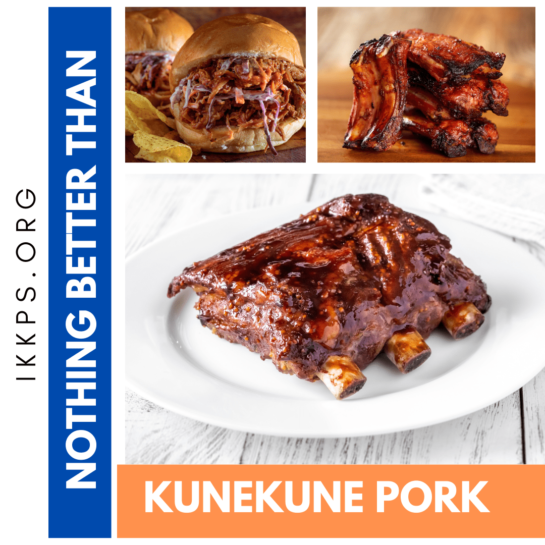
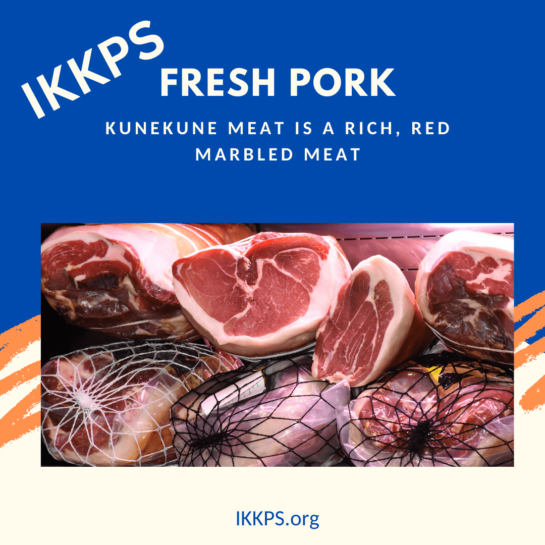
Breed Characteristics
Most importantly, the temperament is one of their best qualities and why farmers love working with KuneKune pigs So, they have distinct characteristics, and it is often said that they look like something straight out of a Walt Disney movie. KuneKunes have Piri Piri (as New Zealand calls it) or wattles under their jowl. These are fleshy appendages just hanging there. Consequently, the wattles serve no real purpose for homesteaders, but it is a desirable trait for KuneKunes according to most KuneKune Registry breed standards. When breeding, wattles are preferred by most KuneKune breeders.
As a result of being a grazing pig, this heritage breed of swine is a grazing animal that can fatten totally on grazing. Likewise, this is great for KuneKune pigs' meat. Healthier as well. Therefore, this breed is so easygoing that they are ideal for first-time pig farmers. Additionally, you can move KuneKunes from pasture to pasture with just a box of Cheerios and they may even attempt to beat you there! They are highly food motivated and if you tend to feed on the same schedule twice a day, you will swear that they can even tell time!
Added Benefits of using Kune Kune meat
KuneKune Pigs are not prone to rooting or testing fencing. However, they will root in their mud puddles and if you don’t dig them out, they are happy to give you a hand. Destroying the pasture is not something to be concerned about, depending on how you manage your herd, they want to graze the land, not destroy it. Unlike commercial breeds of swine which can bring down a full-grown tree with their rooting. Yes, I have heard of that happening before with a neighbor who had commercial swine. I could barely believe it. However, since I saw it myself, I know that it is true.
Being on the smaller side, versus the commercial hog that gets up to one thousand pounds, KuneKune are easier for smaller farming operations. Ideal for homesteading purposes where you want to know where the food you serve is from and how they were cared for. KuneKunes can easily be kept on a ½ acre for up to 4-5 pigs. However, having at least 2-3 areas of this size is ideal. Once they graze down the grass move them to another pasture so they can begin to graze the new one while the previous one is re-growing.
Raising KuneKune pigs for meat has many health benefits and being a grazing pig their meat is much healthier for you as well. There are so many benefits to consider.
Feed Quality
Unlike most commercial swine, you will not dump tons and tons of food into a KuneKune Pig. They graze for most of their nutrition and only need a small amount of grain daily. Usually, 2 cups (8 oz cups) of grain that is 16% and under protein level grain twice a day is enough to sustain a KuneKune Pig. This makes this breed much more cost-effective as compared to commercial hogs. Of course, KuneKune will enjoy any leftover fruits and vegetables from your garden and will be happy to help you clean out your garden at the end of the season. Do you have apples in an orchard or oak trees? Well, again KuneKunes to the rescue as they will ensure all fallen fruit is rapidly cleaned up. They love acorns and will also keep that area free of debris for you.
Slow-Growth
KuneKune are slower to grow pig sometimes taking 9 months – 12 months to mature to a good harvest weight. Herd management styles can directly affect the age of harvest. Another important thing to consider is the KuneKune Bloodline. While there are many “bloodlines” here in the USA now, there are some that are particularly suited for a KuneKune Pork production program. Some of those are Wilsons Gina, Jenny, Ru, and Tuahuru just to name a few.
While they are slower to mature, their pork is worth the wait. You just cannot rush perfection. Plus, they are entertaining little creatures and so friendly, it is easy to
have them a few extra months.
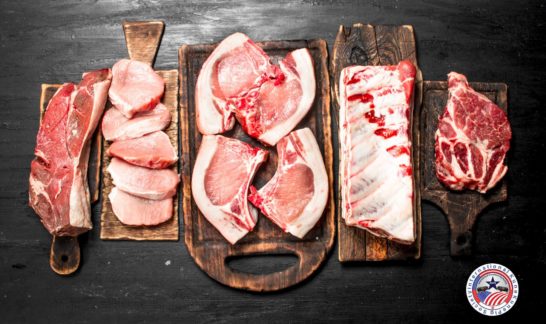

Humanely Raised Pork
Your customers will enjoy knowing that you have humanely raised, pastured pork versus the way commercial breeds are confined indoors, and often sows are treated extremely poorly. Sows are often put in farrowing crates and forced to lay on their side all day to nurse piglets and minimize a sow accidentally lying on one. I have seen these videos all over the internet and could not imagine raising animals like that.
The life of a KuneKune is quite different. KuneKunes are allowed to explore pastures, are raised outdoors, and are allowed to live the life of a pig. Mom happily sings to
their offspring in an environment that is open inside the farrowing quarters for mom to move inside or outside as she chooses. Once you see a way a KuneKune mom nurtures her offspring, you will never look at grocery store pork the same way again.
Butchering at home
Due to their smaller size, many homesteaders will skip the meat processors and even process their animals right at home. Not having the stress will help your meat
taste better. Most processors will even keep a pig for a couple of days to avoid that stress factor for improved flavors.
Butchering Technique Resources
This is a great easy to understand article of the full process.
More about cuts of pork:
Meat processors
Not all processors are created equally. It may take you a couple of tries to find someone that does it exactly like you want them to. Being knowledgeable by using the links above will put you ahead in understanding exactly what you want out of your pork processors.
If you are going to offer pork for sale, it is wise to use a USDA processor. There are many in various locations throughout the USA. So, it is easy to find one close to you. I tend to like smoked meat and be sure to ask if they are USDA certified for smoking as well.
To label the pork as KuneKune pork, you must have registered KuneKunes. Most purebred registries will have a meat pedigree or companion pedigree or for IKKPS we have a grazing pig pedigree. You do not need to DNA a meat pig. The pedigree registration certificate is to prove that the pig is purebred KuneKune. Please be sure to check with your processor on their requirements as well as state and local ordinances and if you need licenses for selling pork in your state or province. Each state or province will have its own rules for selling meat to the public.
If you are only making pork for your family and friends, in most cases, you will not have to use a USDA processor. Again, you will always want to check the state guidelines as well.
In Conclusion
KuneKunes are an excellent choice if you're looking for a sustainable and ethical source of meat. Not only are they incredibly tasty, but they are also an excellent source of nutrients. With their unique flavor and versatility, you can enjoy a healthy and delicious meal every time you cook them. On top of that, they're much easier to raise than other types of livestock, making them a great option for small-acre pig farms. So, if you're looking for an ethical and sustainable meat source, look no further than KuneKune pig meat!
Additional Articles and eBook to learn more about KuneKune Meat
KuneKune Meat Prices
KuneKune, a rare breed of pig native to New Zealand, has grown in popularity in recent years due to its unique characteristics and delicious meat. Often considered a delicacy KuneKune meat is commanding higher prices in the market compared to other pork varieties. Today we will explore the reasons behind the higher prices of KuneKune meat and discuss why this breed is worth the investment.
Firstly, the limited availability of KuneKune pigs contributes to the higher prices of the KuneKune meat prices. KuneKune pigs are not as widely bred or raised as commercial pig breeds. Their population is still relatively small although they are growing in popularity in the meat market. This restricted supply naturally drives up the demand for KuneKune meat, leading to increased prices in the market.
Furthermore, the unique characteristics of KuneKune pigs make their meat a valuable commodity. KuneKune meat is known for its exceptional taste, tenderness, and marbling. These pigs have a slower growth rate compared to commercial breeds, which allows the meat to develop more flavor. Additionally, the ample fat marbling in KuneKune meat contributes to its succulent texture and enhances the overall dining experience. Such distinctive qualities make KuneKune meat highly desirable among consumers, and they are willing to pay a premium price for this exceptional product.
Cost of Raising KuneKunes contribute to the KuneKune Meat Prices
Another factor that affects the price of KuneKune meat is the specialized care and attention required to raise these pigs. KuneKune pigs thrive in free-range environments and are known for their docile nature. They require less space and can be raised on pasture, which aligns with the growing demand for ethically and sustainably produced meat. The extra time and effort needed to raise KuneKune pigs, providing them with a high-quality diet and a stress-free environment, contributes to the higher cost of production. This, in turn, is reflected in the final price of KuneKune meat.
Nutritional Value of KuneKune Meat
KuneKune meat offers many nutritional benefits, making it an attractive choice for consumers who are looking to invest in a premium product. Compared to traditional breeds, KuneKune meat is healthier and contains lower levels of saturated fat. It also has higher amounts of omega-3 fatty acids, which are essential for maintaining heart health. The superior nutritional profile of KuneKune meat makes it an appealing option for health-conscious individuals who are willing to pay more for a high-quality, nutritious product.
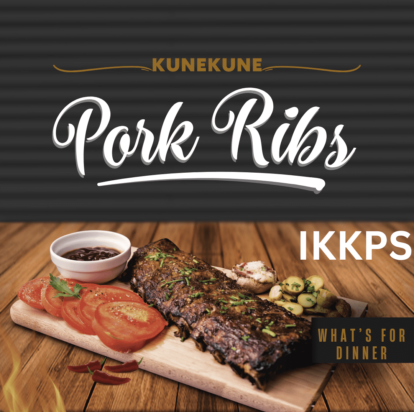
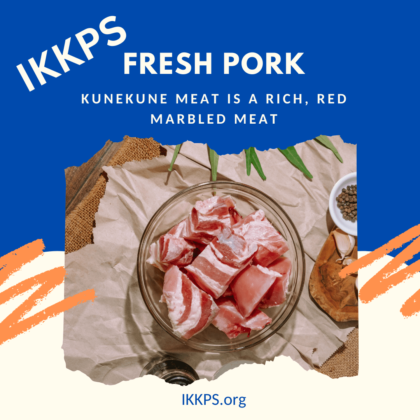
KuneKune Meat Prices
When it comes to pricing, it's important to note that costs can vary based on your location. Typically, you can expect to pay anywhere from $7 to $15 per pound, with the specific price depending on the cut of meat and the region you're in. For instance, sausages may be less expensive than a roast. Additionally, you may have the option to purchase KuneKune on the hoof, allowing you to customize how the meat is cut. To begin your search, consider reaching out to KuneKune breeders in your area using resources such as our Breeder's Map or Breeder's List.
In Conclusion
the higher price of KuneKune meat can be attributed to several factors. The limited availability and high demand for this rare breed, as well as its unique taste and tenderness, contribute to the increased market value. Additionally, the specialized care required in raising KuneKune pigs and the nutritional benefits associated with their meat further justify the higher price tag. Despite the elevated cost, KuneKune meat offers a premium culinary experience that is worth the investment for those seeking exceptional taste, quality, and nutritional value.
Frequently asked questions:
Why is KuneKune pigs perfect for homesteaders?
In recent years, there has been a growing interest in self-sustainable living, particularly among homesteaders. These individuals seek to lower their carbon footprint, reduce their dependency on commercial systems, and promote a self-sufficient lifestyle. One aspect of homesteading that has gained prominence is the rearing of livestock for meat production. Among the various meat options available, KuneKune meat stands out as a perfect choice for homesteaders due to its numerous advantages.
First and foremost, KuneKune pigs are an ideal choice for homesteaders due to their manageable size. These pigs are relatively small compared to commercial pig breeds and can be easily handled by small-scale producers. Their compact size makes them perfect for homesteaders with limited space, allowing them to raise these animals without requiring extensive land or facilities.
Another advantage to KuneKune Meat
Another advantage of KuneKune meat for homesteaders is the breed's exceptional adaptability to various climates and environments. These pigs are native to New Zealand, where they have been bred to withstand harsh weather conditions, making them resilient to heat, cold, and diverse habitats. As a result, homesteaders can rear KuneKune pigs in different geographical regions without the need for expensive climate-controlled shelters or extensive modifications to their homesteads.
Moreover, KuneKune pigs are known for their docile and friendly nature, making them suitable for homesteaders seeking a stress-free and pleasant animal-rearing experience. Unlike some other pig breeds, KuneKune pigs are not known for aggression or destructive behavior. They can be easily trained and handled, creating a safe environment for both the animals and the homesteader. This gentle temperament also allows children to participate actively in the care and feeding of the pigs, promoting valuable life skills and instilling a sense of responsibility in the younger generation.
Meat Quality
Furthermore, KuneKune pigs are renowned for their high-quality meat. The meat of KuneKune pigs tends to be marbled, flavorful, and succulent due to the breed's renowned slow growth rate. Homesteaders focusing on meat production can take pride in knowing that their KuneKune pigs produce a premium product that exceeds the quality of commercially raised pork. This aspect appeals to discerning consumers who value flavor, tenderness, and ethical sourcing. Therefore, homesteaders raising KuneKune pigs can tap into a niche market and earn higher prices for their meat.
Additionally, KuneKune pigs possess excellent foraging abilities, drastically reducing homesteaders' feed costs. These pigs have a natural inclination to graze and root, allowing them to supplement their diet with pasture, grass, and other vegetation. By utilizing their foraging instincts, homesteaders can lower their expenses on expensive commercial feed, positively impacting their overall budget.
Summary
In conclusion, KuneKune meat stands out as an ideal choice for homesteaders due to its manageable size, adaptability, docile nature, high-quality meat, and excellent foraging abilities. These advantages make KuneKune pigs perfect for small-scale farmers seeking a sustainable and self-sufficient lifestyle. By raising KuneKune pigs, homesteaders can enjoy a rewarding experience while ensuring superior meat quality, reducing costs, and minimizing their impact on the environment.
Is KuneKune Meat really better for you?
Heritage pork, also known as old-fashioned or artisanal pork, has been gaining popularity as a potentially healthier option. This type of pork comes from traditional pig breeds that are raised emphasizing the importance of genetic diversity, animal welfare, and sustainable farming practices. While KuneKune meat offers a unique and flavorful dining experience, it is important to evaluate whether it indeed deserves the label of a healthier option.
One of the main arguments in favor of heritage pork's health benefits is its nutritional composition. Advocates claim that this pork contains higher levels of monounsaturated fats and omega-3 fatty acids than commercially raised pork. Monounsaturated fats can lower bad cholesterol levels, while omega-3 fatty acids contribute to heart and brain health. These components offer certain health advantages.
Other Considerations
Another factor considered when evaluating the healthiness of KuneKune meat is the farming methods employed. Heritage pigs are often allowed to roam and forage outdoors, mimicking their natural behavior. This promotes exercise, reducing the risk of obesity and increasing lean muscle development. Additionally, these pigs are typically fed a varied diet that includes grass, roots, and other natural food sources.
Moreover, KuneKune pig meat is free from growth hormones and antibiotics, commonly found in conventionally raised pork. These additives promote rapid growth and prevent disease in intensively-raised pigs. By avoiding growth hormones and limiting antibiotic usage, KuneKune meat is perceived as a more natural and healthy alternative.
In Summary
In conclusion, KuneKune meat can be a tasty and unique addition to your table, and it is associated with potential health benefits. The higher levels of monounsaturated fats and omega-3 fatty acids, along with the natural farming methods employed, can contribute to a healthier eating experience.
Is it hard to harvest your own KuneKune pigs for meat?
Harvesting farm animals, also known as slaughtering, is an integral part of the agricultural process for individuals or communities who raise animals for food consumption. It is a critical step that allows farmers to transform their livestock into a source of sustenance. While some may find this process challenging or emotionally trying, it is essential to recognize the significance of this practice in terms of self-sufficiency, sustainability, and personal ethics.
One of the reasons why some might find harvesting farm animals difficult is the emotional attachment formed with these creatures. With KuneKune pigs being so docile and charming, it can make it a bit more difficult for KuneKune Breeders. Farmers often raise their livestock from birth, and over time, a bond develops between them. Witnessing the end of an animal's life, especially one that you have cared for and nurtured, can be challenging. However, it is crucial to consider the context in which these animals are raised. In small-scale farming, there is usually more individual attention given to each animal, ensuring their well-being and creating a higher quality of life for them. The personal connection that farmers develop with their animals also promotes responsible and ethical practices when it comes to their slaughter. They live a happy and fulfilling life and have one bad day.
Technical Skills
Another aspect of the difficulty in harvesting farm animals is the physical and technical skills required. Slaughtering an animal involves precision, experience, and knowledge of anatomy. One must be adept at proper handling, as well as proficient in identifying the best environmental conditions for slaughter, such as an appropriate space, equipment, and sanitary measures. These skills can be challenging to acquire, especially for those who haven't grown up around agricultural practices or lack proper training. However, with the availability of resources, educational courses, and guidance from experienced farmers, individuals can learn the necessary skills and techniques to carry out this task.
Using a processor is usually the easiest thing to do when harvesting your KuneKune pigs for meat. However, all processors are not created equal. Make sure that you select a processor that is accustomed to working with KuneKune pigs for meat.
Philosophical Debate
The difficulty of harvesting farm animals can extend beyond the emotional and technical aspects to a more philosophical debate concerning the value of life and the ethics of eating meat. Some individuals may find it hard to reconcile their personal beliefs regarding animal welfare and the act of taking an animal's life. It requires introspection and a clear understanding of one's ethical framework to navigate such challenges. However, for many farmers or individuals who desire self-sufficiency and a sustainable lifestyle, there can be a profound sense of fulfillment in being actively involved in all stages of their food production, including the slaughter of their own livestock.
On the other hand, the process of harvesting farm animals can also provide individuals with a greater appreciation for the options available in the market. It can create awareness of the journey that food takes from farm to table and instill a sense of gratitude for the efforts of farmers and others involved in the food industry. By participating in the entire process of raising and harvesting animals, individuals can develop a deeper connection with their food and make more informed choices regarding their diet.
In Summary
In conclusion, harvesting farm animals can be challenging for various reasons, including emotional attachment, necessary physical skills, and philosophical considerations. However, it is important to recognize the broader context in which this practice takes place. By understanding the significance of self-sufficiency, sustainability, and personal ethics, the process can be seen as an essential part of agriculture and an avenue for individuals to connect with the food they consume. It is through this understanding that the difficulty can transform into a fulfilling and rewarding experience that strengthens our relationship with nature and the food we eat.
Breaking Down the Benefits: Why Raising Kunekune Pigs for Meat is the Perfect Choice
Thinking about raising Kunekune pigs for meat? Look no further! In this article, we will break down the numerous benefits of choosing Kunekune pigs as your meat source. With their adorable appearance, friendly nature, and fantastic meat quality, it is no wonder why more people are turning to this versatile breed.
Kunekune pigs are known for their docile temperament, making them easy to handle and a pleasure to work with. This makes them the perfect choice for small-scale farmers or beginners in pig farming. Not only are Kunekune pigs a joy to raise, but they also produce incredibly flavorful and tender meat. Their meat is marbled with healthy fats, resulting in a rich and succulent flavor that will leave your taste buds craving more.
But it does not end there! Kunekune pigs are also known for their grazing abilities and ability to convert forage into meat. This means you can reduce the costs of feeding and rely on pasture-based systems, making it a more sustainable and cost-effective option. So, if you are looking for a unique and rewarding meat source, raising Kunekune pigs might just be the perfect choice for you. Start reaping the benefits today!
Nutritional benefits of Kunekune meat.
Kunekune pigs are not only a delight to raise but also provide a range of nutritional benefits. Their meat is lean and packed with essential nutrients, making it a healthy choice for meat lovers. KuneKune meat is low in saturated fat and rich in omega-3 fatty acids, which are known to promote heart health. Additionally, it is a reliable source of protein, vitamins B6 and B12, and minerals such as zinc and selenium. The combination of these nutrients not only nourishes your body but also supports overall well-being. Enjoying a meal of tender KuneKune meat means indulging in both taste and nutrition.
Environmental benefits of raising Kunekune pigs
In today's world, sustainability is a key consideration for many farmers. Kunekune pigs offer several environmental benefits that make them an ideal choice for sustainable meat production. These pigs are excellent grazers and have a natural ability to convert forage into meat. By allowing Kunekune pigs to graze on pasture, you can reduce the costs associated with feeding them commercially produced feed. This not only saves you money but also reduces the environmental impact of traditional feed production. Raising Kunekune pigs in a pasture-based system also promotes biodiversity and helps maintain healthy soil. These pigs have a minimal ecological footprint, making them a sustainable choice for conscientious farmers. paragraph is that it has a more-or-less normal distribution of letters. making it look like readable English.
Ethical considerations in raising Kunekune pigs.
When it comes to raising livestock for meat, ethical considerations play a crucial role. Kunekune pigs are known for their docile and friendly nature, making them a pleasure to work with. They have a calm temperament and are easily handled, which reduces stress for both the pigs and the farmers. Additionally, Kunekune pigs thrive in smaller spaces, making them suitable for small-scale farmers or those with limited land.
These pigs are also known for their ability to adapt to various environments, making them resilient and versatile. By choosing Kunekune pigs for meat production, you can ensure that the animals are raised humanely and respectfully.
Health benefits of Kunekune meat
In addition to being delicious, Kunekune meat offers a range of health benefits. The meat is high in monounsaturated fats, which are considered heart-healthy fats. These fats can help lower bad cholesterol levels and reduce the risk of heart disease. KuneKune meat is also a useful source of essential vitamins and minerals, including iron and zinc, which are important for maintaining a healthy immune system and supporting proper bodily functions. Furthermore, the marbling of healthy fats in Kunekune pork enhances the flavor and tenderness of the meat, providing a truly satisfying dining experience. By incorporating KuneKune meat into your diet, you can enjoy a delicious meal while supporting your health.
Economic advantages of raising Kunekune pigs
Raising Kunekune pigs for meat can be a financially rewarding endeavor. These pigs are highly efficient at converting forage into meat, which can significantly reduce feeding costs. Additionally, Kunekune pigs have a low feed requirement compared to other pig breeds, further reducing expenses. The demand for KuneKune meat is steadily increasing due to its superior quality and unique flavor profile, making it a premium product in the market. This presents an opportunity for farmers to fetch higher prices for their meat, resulting in increased profitability. With careful planning and marketing, raising Kunekune pigs can be a lucrative business venture for farmers.
Kunekune pig farming requirements and considerations
Before embarking on Kunekune pig farming, it is important to understand the specific requirements and considerations involved. Kunekune pigs require adequate space for grazing and exercise, making them unsuitable for intensive confinement systems. It is important to provide a well-fenced pasture area where the pigs can roam freely. Additionally, Kunekune pigs are social herd animals and thrive in the presence of other pigs. They also require access to shelter and clean water at all times.
When it comes to breeding, Kunekune pigs have a high fertility rate, making them an attractive option for pig farmers. However, it is essential to have a plan in place for managing the piglets and finding suitable markets for them. By understanding and addressing these requirements and considerations, you can create a conducive environment for raising healthy and happy Kunekune pigs.
Processing and marketing KuneKune meat
Once you have successfully raised Kunekune pigs, the next step is processing and marketing the meat. It is important to find a reputable and licensed processing facility that can handle the butchering and packaging of the meat. Proper processing ensures that the meat is safe for consumption and maintains its quality. When it comes to marketing Kunekune pork, it is essential to highlight its unique selling points, such as its superior taste, tenderness, and nutritional benefits. Consider targeting niche markets, such as farm-to-table restaurants or health-conscious consumers, who appreciate the quality and sustainability of Kunekune pork.
Establishing relationships with local retailers and farmers' markets can also help increase the visibility and demand for your product. By effectively processing and marketing KuneKune meat, you can create a successful and profitable meat business.
Success stories of Kunekune pig farmers
There are numerous success stories of farmers who have chosen to raise Kunekune pigs for meat. These farmers have embraced the benefits of this breed and have successfully built thriving businesses around it. From small-scale farmers who have found fulfillment in sustainable farming practices to larger operations that have tapped into the growing demand for specialty pork, the opportunities with Kunekune pigs are diverse. These success stories serve as inspiration for aspiring Kunekune pig farmers and highlight the potential for a rewarding and profitable venture in the meat industry.
Conclusion: Why raising Kunekune pigs for meat is the perfect choice
In conclusion, raising Kunekune pigs for meat offers a multitude of benefits. From the nutritional advantages of lean and flavorful pork to the environmental and ethical considerations of sustainable farming practices, Kunekune pigs check all the boxes. Their docile nature, grazing abilities, and adaptability make them a joy to work with, while their superior meat quality and unique flavor profile make them a favorite among discerning consumers. Whether you are a small-scale farmer looking for a rewarding venture or a meat lover searching for a delectable and sustainable option, raising Kunekune pigs for meat is the perfect choice. Start reaping the benefits today and discover the joys of Kunekune pig farming.
If meat production is high on your goals for raising KuneKune Pigs, you may want to consider this book available in our bookstore as a great resource.
Registry Office
17500 Hamilton Arms Court Dewitt, VA 23840